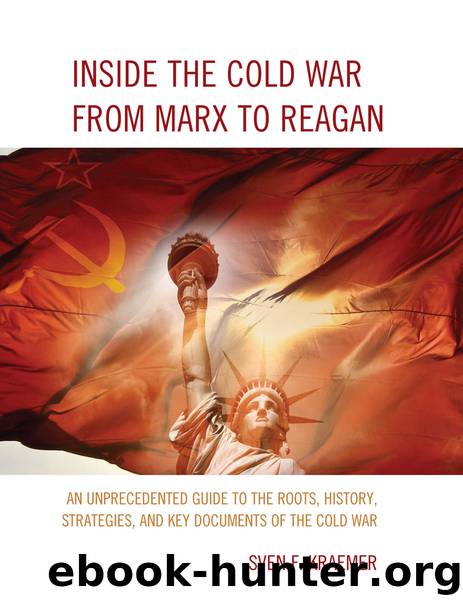Inside the Cold War From Marx to Reagan by Sven F. Kraemer

Author:Sven F. Kraemer
Language: eng
Format: epub
ISBN: 9780761866237
Publisher: UPA
4. Reagan’s START Revolution in Strategic Arms Control: “Eureka”—May 1981–June 1982
Reagan’s presidential campaign and early presidential statements on accelerated Soviet strategic modernization and increased numbers of Soviet forces, focused on his outrage that the U.S. had continued to set unilateral constraints on itself. These included the cancellation and/or delay of vital U.S. programs like the MX missile and the B–1 bomber, while relying on deeply flawed “arms control” efforts that did not reduce weapons, had unequal impact, and were neither effectively verifiable nor enforceable in dealing with the deceptions, violations, and aggressive global imperial drive of the Soviet Union. Reagan’s response was to assess and counter the rising Soviet strategic threat both by U.S. strategic force modernization and by also dramatically changing arms control requirements and strategy.
Early Presidential Decisions on Carter’s SALT II—1981. Early in 1981, one of Reagan’s first tasks was to decide what to do about Carter’s controversial Strategic Arms Limitation Treaty the SALT II Treaty, which, though withdrawn by Carter from U.S. Senate ratification consideration after the Soviet invasion of Afghanistan in December 1979, still had diplomatic standing. The Soviet Union and Reagan’s opponents in the Democratic Party, the media, and the “arms control community,” including part of the U.S. bureaucracy, vigorously pushed for Carter’s SALT II to be the basis for Reagan’s new U.S.-Soviet negotiations. In contrast, Reagan and his new national security team understood that SALT II had serious flaws, worse than those of Nixon’s SALT. They adopted a policy that did not endorse SALT II but merely stated that “at this time the U.S. would not undercut SALT II levels” by exceeding SALT’s traditional “caps” and its links to the ABM Treaty and MAD. At the same time, Reagan’s new approach signaled a coming U.S. policy change that would seek to correct SALT II arms buildups and inequities (e.g., in throw-weight and numbers of “first-strike” systems); its dangerous constraint on the U.S. modernization required to restore and maintain strategic parity; and its lack of effective, high-confidence verification. A year of comprehensive NSC-coordinated Interdepartmental Group studies was launched on the basis of this new approach to assess options for strategic arms control reductions as integrated with U.S. strategic deterrence and defense priorities.
Early Private Correspondence with Brezhnev on START—1981. In his TV Address to the Nation on INF on November 18, 1981 on his “zero-zero” Intermediate Nuclear Forces (INF) initiative, Reagan revealed that he had written two letters to Soviet premier Leonid Brezhnev early in 1981. He quoted an excerpt of his proposal for new U.S.-Soviet strategic arms control negotiations that emphasized reductions to begin early in 1982 on: “truly substantial reductions . . . [to] levels that are equal and verifiable. . . . To symbolize this fundamental change in direction we will call these negotiations START-Strategic Arms Reduction Talks.”5
NSSD 3–82—Preparing the U.S. START Position, JCS Certification—March 1982. An NSC study directive, NSSD 3–82—U.S. Policy and Negotiating Position for the Strategic Arms Reduction Talks, prepared by the Interdepartmental Group (IG) on START and issued by
Download
This site does not store any files on its server. We only index and link to content provided by other sites. Please contact the content providers to delete copyright contents if any and email us, we'll remove relevant links or contents immediately.
| Anthropology | Archaeology |
| Philosophy | Politics & Government |
| Social Sciences | Sociology |
| Women's Studies |
The Secret History by Donna Tartt(19047)
The Social Justice Warrior Handbook by Lisa De Pasquale(12186)
Thirteen Reasons Why by Jay Asher(8892)
This Is How You Lose Her by Junot Diaz(6875)
Weapons of Math Destruction by Cathy O'Neil(6264)
Zero to One by Peter Thiel(5786)
Beartown by Fredrik Backman(5737)
The Myth of the Strong Leader by Archie Brown(5496)
The Fire Next Time by James Baldwin(5431)
How Democracies Die by Steven Levitsky & Daniel Ziblatt(5213)
Promise Me, Dad by Joe Biden(5141)
Stone's Rules by Roger Stone(5080)
A Higher Loyalty: Truth, Lies, and Leadership by James Comey(4950)
100 Deadly Skills by Clint Emerson(4919)
Rise and Kill First by Ronen Bergman(4778)
Secrecy World by Jake Bernstein(4740)
The David Icke Guide to the Global Conspiracy (and how to end it) by David Icke(4699)
The Farm by Tom Rob Smith(4502)
The Doomsday Machine by Daniel Ellsberg(4484)
